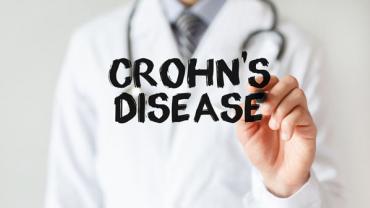
In a recently published study in the Proceedings of the National Academy of Sciences, researchers have discovered a critical link between a specific cytokine, IL-1?, and the gut microbiome. Interleukin-1? (IL-1?) is a protein that controls inflammation in the gut. The researchers were shocked to find that by blocking this pro-inflammatory protein in the gut there was a significant decrease in the severity of intestinal inflammation in mouse models of Crohn’s disease (CD).
Researchers found that the effect of the anti-IL-1alpha treatment used in the study was controlled by changing the intestinal microbial ecosystem, correcting mucosal dysbiosis. The IL-1? antibody treatment led to a decreased ratio of Proteobacteria to Bacteriodetes, decreased Helicobacter species and increased Mucispirillum schaedleri and Lactobacillus salivarus. This microflora modification was linked to the neutralization of IL-1? and amelioration of chronic ileitis, similar to the biological effects of steroids which has been considered the “gold standard for treatment”.
These findings show that, yet again, the diversity and balance of the gut microbiome play a huge role in not only gastrointestinal health but also the health of the immune system and inflammatory response. Although this study was performed on mice and further research is needed, it gives researchers hope for finding therapeutic targets for patients who suffer from these debilitating conditions and provides the rationale for conducting the very first human clinical trial blocking IL-1? in patients with IBD.
IBD (Crohn's disease and ulcerative colitis) is an autoimmune condition where, in most cases, there are multiple triggers chronically stimulating the immune system over a long period of time, causing the immune system to become overburdened and unable to function properly. The chronic inflammation as a result of function loss leads to chronic gastrointestinal ailments characterized by diarrhea, severe abdominal pain, bleeding, and other crippling manifestations that greatly affect patients’ quality of life.
It comes as no surprise that the microbial composition of the GI tract plays a huge role in the development of IBD and that an imbalance – or dysbiosis – is associated with increased intestinal inflammation that may cause IBD. It is well-researched that the intestinal microbiome greatly impacts immune health, as 70% of the immune system lies within the GI tract. Studies demonstrate that there are chemical and molecular events that shift the microbiome and exacerbate disease activity in patients with IBD, while in contrast, the gut microbiomes of healthy individuals were shown to be much more stable. Furthermore, science shows that Escherichia coli (E. coli) proliferates in IBD during flare-ups, which can further contribute to a patient’s symptoms and progression of the disease.
Aside from avoiding pro-inflammatory foods like sugars, grains, refined carbohydrates, processed meats, trans fats, and vegetable oils, and increasing intake of an anti-inflammatory diet rich in antioxidants from vegetables and fruits, olive oils, grass-fed and pastured meats, and wild-caught fatty fish rich in omega-3s, high dose prebiotic and probiotic supplements may assist the inflammatory response within the GI tract to help reduce IBD flare-ups. Certain bacteriophages (classified as prebiotics and harmless to human cells) have been shown to infect and inhibit the growth of E. coli, which can also help reduce symptoms and potentially slow the progression of IBD.
Supplementing with glutamine, fish oil, and mucilaginous botanicals may also be helpful due to their anti-inflammatory properties. Low levels of vitamin D have been shown to increase the risk of relapse in patients with ulcerative colitis warranting the potential need for supplementation in patients with IBD. Newer research demonstrates that other dietary strategies such as the low FODMAP, specific carbohydrate, and fasting-mimicking diets reduce inflammatory bowel disease pathology and promote intestinal regeneration. All of these are possible therapeutic strategies to consider for patients with CD to help reduce inflammation and balance the intestinal microbiome.